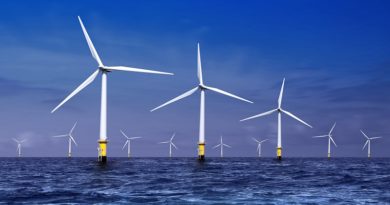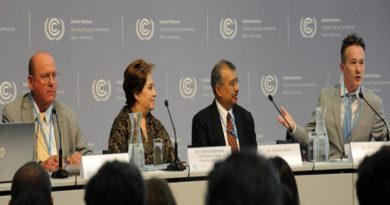Delegates to discuss draft decisions as triple COPs starts on Monday in Switzerland
Delegates from governments, academia, civil society and other stakeholders across the world at the weekend arrived Geneva, Switzerland for the 2019 Meetings of the Conferences of the Parties to the Basel, Rotterdam and Stockholm Conventions that will kick off on Monday.
The two weeks triple COPs will further chart a course on sound management of chemicals and waste for a clean planet and healthy people.
The 2019 Meetings of the Conferences of the Parties to the Basel, Rotterdam and Stockholm Conventions take place in Geneva, Switzerland from April 29 to May 10.
Toxic chemicals from human activities are found in all Earth’s ecosystems, including the Arctic and other remote corners of the planet. Many chemicals, such as pesticides and other persistent organic pollutants (POPs) and mercury, travel over large distances through air and water currents. When misused or unsafely disposed of, these substances negatively affect biodiversity, agricultural production, water and air quality, and human health.
The Basel, Rotterdam and Stockholm Conventions protect human health and the environment from the harmful impacts of toxic chemicals and waste. The GEF finances the elimination of the most harmful chemicals, which are covered by the Stockholm Convention on POPs, the Minamata Convention on Mercury, and the Montreal Protocol on Substances that Deplete the Ozone Layer. The GEF as a financial mechanism of the Stockholm Convention is participating in the 9th Conference of the Parties of the Stockholm Convention as well as in parallel the 14th Conference of the Parties of the Basel Convention and the 9th Conference of the Parties of the Rotterdam Convention.
United by the theme “Clean Planet, Healthy People” these three multilateral environmental agreements jointly set the agenda and further action on sound management of chemicals and waste, and eliminating or reducing toxins that can cause adverse effects on health and environment like cancer, birth defects, and immune and reproductive system dysfunction.
Draft decisions to be discussed at the COPs include the listing under the Stockholm Convention of two fluorinated industrial chemicals that have been found to contaminate drinking water supplies in many communities. Perfluorooctanoic Acid (PFOA) is widely used in the production of non-stick cookware and food processing equipment as well as a surfactant in products such as firefighting foams. While, Perfluorohexane-1-sulfonic acid (PFHxS) has wide applications from textiles, apparel and non-stick cookware.
The highly toxic organochlorine pesticide Dicofol, which is used to control mites on many crops and known to be harmful to humans and the environment is also being proposed for listing. It should be noted that the GEF has already supported the phase out of the production of Dicofol in China. Also to be considered at the COPs is the listing of seven additional chemicals under the Rotterdam Convention; and a new Basel Convention partnership on plastic waste and amendments to better incorporate plastic waste into the existing control mechanisms of the Convention.
GEF implementation support for the chemicals and waste conventions allows countries to meet their obligations under the conventions and to transform their management of chemicals, using and producing chemicals without suffering their harmful impacts.
In the replenishment of the GEF-7 – GEF’s most recent funding cycle – the donors to the GEF demonstrated their strengthened commitment to ridding the world of the most harmful chemicals by increasing the resources to chemicals and wastes to approximately US$600 million, which accounts for 15% of the total GEF-7 replenishment.
With these funds, the GEF will facilitate the reduction of chemicals through a stronger push to shift the global economy to sustainable production and consumption.
Over the next four years the GEF will also seek stronger private sector engagement and will create environments that encourage the adoption of better technologies and practices.
GEF-7 programs seek to integrate individual chemical convention issues into a sector-based approach that better aligns with national efforts to improve industrial chemical use and waste. This shift from a chemical-based approach to a sector focus facilitates better integration of improved policies into national level agricultural policy, industrial manufacturing, and pollution management.
As of June 30, 2018, the GEF has cumulatively programmed $1.2 billion in projects that support the Stockholm Convention since its adoption in May 2001. This GEF investment has leveraged approximately $4.8 billion in co-financing to bring the total value of the GEF POPs portfolio to over $6 billion.
The issue of plastic waste has rapidly developed into a global crisis and will receive special attention at the 2019 Meetings of the COPs to the Basel, Rotterdam and Stockholm Conventions.
Some 8–13 million tons of plastic end up in our oceans every year, the equivalent of one garbage truck full of plastic dumped into the ocean each minute. Plastic makes up 80% of all marine debris, from surface waters to deep-sea sediments. The main sources of marine plastic are land-based: urban and storm runoff, sewer overflows, inadequate waste disposal and management, industrial activities, construction, and illegal dumping. Plastic pollution threatens not only ocean health, but also food safety and quality, human health and coastal tourism, and contributes to climate change.
In the next four years, the GEF will explore the important synergies between its International Waters and the Chemicals and Waste focal areas to specifically address the challenge of marine litter and micro-plastics.
Recognizing the need to transform the entire life cycle of plastics to reduce marine plastic pollution, the GEF will invest in a few strategic Circular Economy initiatives to promote the adoption of closed loop production and consumption patterns instead of traditional linear take-make-waste approaches. Investments will be focusing on public-private investments to transform the plastic life cycle.
The GEF will hold two side events at the COPs. The first event, “The implementation of GEF-7 in the context of the Stockholm Convention,” will take place on Monday, April 29. The second event, “Best practices for the management of chemicals and waste in the healthcare sector: results and best practices from GEF-funded projects,” is co-hosted with UNDP and UNIDO and will be held on Tuesday, April 30.




